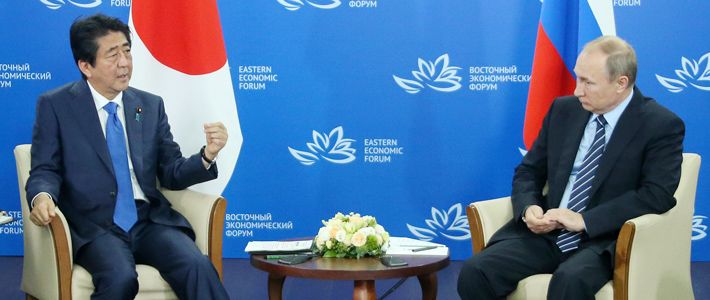
The Northern Territories Dispute: Is a Breakthrough in the Offing?
Politics Economy- English
- 日本語
- 简体字
- 繁體字
- Français
- Español
- العربية
- Русский
The September 2 summit in Vladivostok between Prime Minister Abe Shinzō and Russian President Vladimir Putin has great significance in shaping the course of negotiations to resolve the territorial dispute between Japan and Russia and advancing a strategic bilateral partnership.
The Abe administration seeks to qualitatively lift both economic and diplomatic relations to a higher level and thereby achieve a breakthrough in the dispute over the Northern Territories, which remains the biggest stumbling block to closer ties.
At the May 6 summit in the Russian resort town of Sochi, Prime Minister Abe proposed a broad, eight-point plan covering economic cooperation and personal exchange to further develop the relationship. Skeptics in both countries saw little likelihood of the proposal leading to positive change. Partly to sweep away such skepticism, Prime Minister Abe created a new ministerial post to oversee economic cooperation with Russia on September 1, the day before the Vladivostok summit, and assigned this role to Minister of Economy, Trade, and Industry Sekō Hiroshige.
Sekō accompanied the prime minister to Vladivostok, thus conveying the message that the Abe administration is keen to deepen the economic relationship. The role played by Sekō in Japan’s ties with Russia is likely to increase going forward. In particular, if Sekō succeeds in building rapport with Anton Vaino, chief of staff of Russia’s Presidential Executive Office and a fluent speaker of Japanese, he may play a valuable role in advancing not just trade issues but territorial negotiations as well.
Neither side has disclosed what was discussed at the recent summit regarding the territorial issue. The meeting lasted 3 hours and 10 minutes, with 55 minutes being spent by just the two leaders and their interpreters. I am sure that the territorial topic was discussed quite candidly during the tête-a-tête, but my impression is that neither made any new proposals. In informal interviews with the media, the prime minister said: “President Putin and I held very substantial discussions, particularly about a peace treaty. We’ve laid the groundwork for concrete negotiations based on a new approach, and I came away from the meeting with a strong feeling that we’ll be making progress henceforth. Our two countries have failed to sign a peace treaty for over seven decades since the end of the war, and the only way to overcome this abnormal situation is to seek a solution based on the trust that Mr. Putin and I have developed. Toward that end, we’ve agreed to hold another summit at the November APEC meeting in Peru and to have President Putin visit Japan for a meeting on December 15 in Yamaguchi Prefecture. I’m looking forward to welcoming the president to my hometown of Nagato, where I hope we can talk in a quiet, relaxed setting to speed up the process of reaching an agreement on a peace treaty.”
Japan’s official stance on the Northern Territories is that it will deal flexibly with the timing of the return and other conditions if Russia recognizes Japanese sovereignty of the four islands. In the October 1993 Tokyo Declaration, the two governments agreed to sign a peace treaty after resolving their differences on the jurisdiction of the four islands.
But ever since Prime Minister Abe began to emphasize his “new approach” with Russia, the Foreign Ministry has stopped making Russian recognition of Japanese sovereignty over the four islands a condition for a peace treaty. The ministry has also refrained from referring to the 1993 Tokyo Declaration.
The Foreign Ministry, under instructions from the prime minister, is now probably examining new offers that are likely to appeal to President Putin. One important factor in exploring alternative approaches is the 1956 Japan-Soviet Declaration, in which Moscow clearly promised to hand over Habomai and Shikotan after the conclusion of a peace treaty; this declaration has been ratified by the respective national assemblies and is thus binding under international law.
From Japan’s perspective, this means that it can begin preparing for the reversion of the two islands as soon as the two leaders reach an agreement. That would still leave the dispute over Kunashiri and Etorofu unresolved, but I doubt Japan has devised a clear game plan for the remaining two islands at this point.
A resolution of the territorial dispute and mutual recognition of each other’s national boundaries could, as a consequence, lead to recognition of Russia’s claims on Crimea. This would be a major boost for Putin. The December 15 summit in Nagato could lead to major breakthroughs in many respects.
(Originally published in Japanese on September 3, 2016. Banner photo: President Putin and Prime Minister Abe at the September 2 summit in Vladivostok, Russia. © Jiji.)